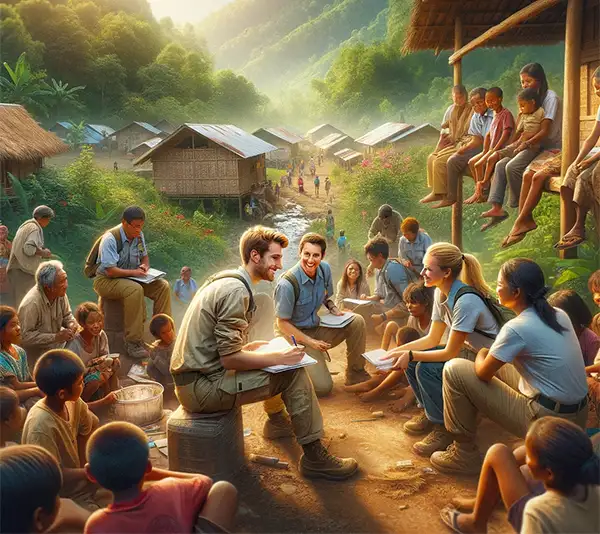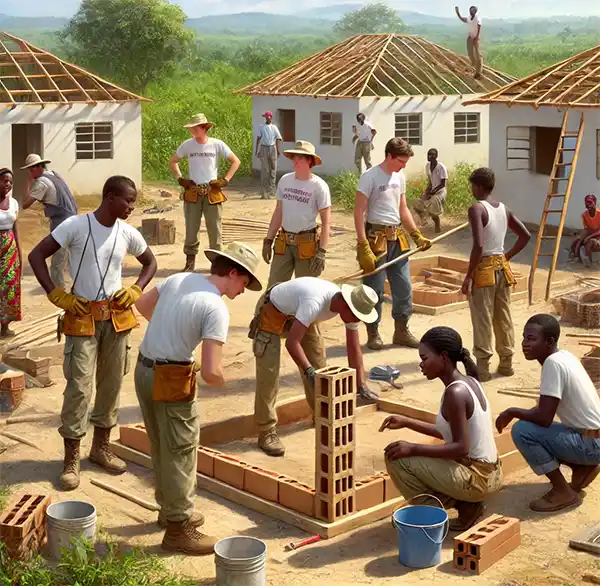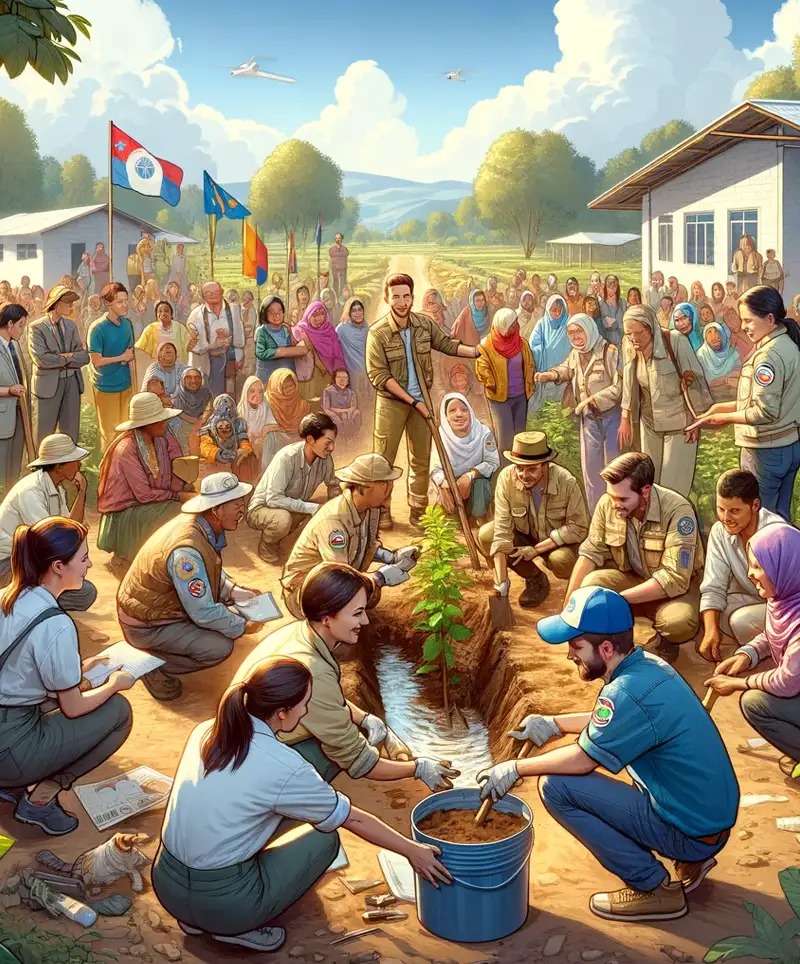Celebrating Global Service
Every year, Peace Corps Week rolls around like a gentle reminder of the incredible power of volunteerism and cross-cultural exchange. Celebrated during the week of March 1st to coincide with the founding of the Peace Corps in 1961, this week is dedicated to honoring the work of thousands of volunteers who have ventured far from home to make a difference in the lives of others. Equal parts inspirational and downright impressive, Peace Corps Week is an opportunity to reflect on service, sacrifice, and the occasional awkward language mishap that brings people together.
 The Origins of the Peace Corps
The Origins of the Peace Corps
It all started with a simple idea: what if Americans could contribute to global development while building bridges of understanding? President John F. Kennedy made this vision a reality on March 1, 1961, when he signed the executive order establishing the Peace Corps. Within months, volunteers were being dispatched to countries around the world to tackle pressing issues like education, healthcare, agriculture, and infrastructure.
The inspiration for the Peace Corps traces back to Kennedy’s campaign trail. On October 14, 1960, during an impromptu speech at the University of Michigan, he challenged students to dedicate themselves to serving in developing countries. The idea caught fire, and thousands of young Americans responded enthusiastically, eager to contribute their time and talents abroad.
Kennedy’s vision was further shaped by the Cold War context. He believed that by promoting international understanding and goodwill, the Peace Corps could serve as a powerful tool for diplomacy. Volunteers wouldn’t just provide technical expertise; they would also embody the ideals of cooperation and cultural exchange, countering negative stereotypes about the United States.
Sargent Shriver, Kennedy’s brother-in-law and the first director of the Peace Corps, was instrumental in turning this vision into a reality. Shriver assembled a team of experts who worked tirelessly to lay the foundation for the organization, crafting its mission and operational structure. By August 1961, the first group of 51 volunteers had landed in Ghana and Tanzania, marking the beginning of a global movement.
Over the decades, the Peace Corps has evolved to meet changing global needs. While its core mission remains the same, programs have expanded to address emerging challenges like climate change, HIV/AIDS prevention, and technology education. Through it all, the Peace Corps has stayed true to its founding principles: fostering peace, understanding, and mutual respect.
Since then, the Peace Corps has sent over 240,000 volunteers to 142 countries. From teaching math in remote villages to helping farmers increase crop yields, Peace Corps volunteers have worked tirelessly to foster peace, friendship, and mutual respect.
What Exactly Do Peace Corps Volunteers Do?
While the title "Peace Corps Volunteer" might sound vague, their work is anything but. These intrepid individuals take on roles that challenge them physically, emotionally, and sometimes gastronomically. Here’s a glimpse into the kinds of projects they tackle:
- Education: Teaching English, math, science, or IT to students who might otherwise lack access to quality education.
- Health: Promoting better hygiene, nutrition, and maternal health practices in communities with limited healthcare access.
- Agriculture: Assisting farmers in adopting sustainable techniques to improve yields and preserve the environment.
- Youth Development: Organizing programs that empower young people with skills, confidence, and opportunities for a brighter future.
- Community Development: Helping communities identify challenges and implement locally-driven solutions, from clean water systems to small business support.
 Let’s not sugarcoat it: serving in the Peace Corps is not a tropical vacation. While Instagram-worthy sunsets may come standard, so do cold showers, mosquito nets, and an appreciation for the fine art of bucket laundry. Peace Corps volunteers quickly learn that flexibility is key, as plans often go awry in ways that are both frustrating and hilarious in hindsight.
Let’s not sugarcoat it: serving in the Peace Corps is not a tropical vacation. While Instagram-worthy sunsets may come standard, so do cold showers, mosquito nets, and an appreciation for the fine art of bucket laundry. Peace Corps volunteers quickly learn that flexibility is key, as plans often go awry in ways that are both frustrating and hilarious in hindsight.
Take, for example, the volunteer who spent weeks teaching locals about handwashing only to be lovingly gifted a live goat as a thank-you. Or the one who accidentally turned a cooking demonstration into a village-wide chili-eating contest because they underestimated the local tolerance for spice. Peace Corps life is rich with such "learning experiences."
Why Peace Corps Service Matters
The impact of Peace Corps volunteers is profound and multifaceted. For the host communities, volunteers bring skills, resources, and a willingness to learn and adapt. They don’t arrive with a savior complex but instead roll up their sleeves to work alongside local partners in a spirit of collaboration.
For the volunteers themselves, the experience is life-changing. It’s one thing to read about global issues and another to live among the people directly affected by them. Many returnees say their time in the Peace Corps reshaped their worldview, deepened their empathy, and gave them a sense of purpose.
Fun Facts About the Peace Corps
The Peace Corps is filled with fascinating tidbits that showcase its impact, diversity, and occasional quirks. These fun facts offer a glimpse into the organization’s unique legacy and the adventures of its volunteers:
- Big Numbers: As of 2023, over 240,000 Americans have served in the Peace Corps.
- Cultural Exchange: Volunteers often bring back recipes, dances, and even languages from their host countries. One returnee famously became a salsa instructor after learning the moves in Colombia.
- Unexpected Challenges: Peace Corps service can involve anything from fending off curious wildlife to mastering the art of carrying water jugs on your head.
- Presidential Connections: Four U.S. presidents, including Jimmy Carter and Bill Clinton, have had family members serve in the Peace Corps.
- Unusual Assignments: A volunteer in the 1970s helped establish a camel dairy in Niger to provide a sustainable milk source for the local population.
- Longest-Serving Country: Ghana was one of the first countries to welcome Peace Corps volunteers in 1961 and continues to host volunteers today.
- Language Enthusiasts: Peace Corps volunteers learn over 200 different languages and dialects during their service, from Swahili to Quechua.
- Global Impact: The Peace Corps has left a lasting legacy, with countless communities benefiting from improved education, healthcare, and infrastructure.
Celebrating Peace Corps Week
Peace Corps Week is more than just an acknowledgment of volunteers’ efforts; it’s a celebration of the connections they’ve made and the lessons they’ve learned. Communities across the U.S. host events like storytelling nights, cultural fairs, and panel discussions featuring returned Peace Corps volunteers. These gatherings are a testament to the idea that even the smallest acts of service can ripple outward, creating waves of positive change.
Now, imagine you’re a Peace Corps volunteer giving a heartfelt presentation in a foreign language you’ve just learned. You think you’re saying, "I am here to help improve health in your community," but a slight mispronunciation leads the audience to believe you’ve declared, "I am here to marry a goat." Cue the laughter, the awkward corrections, and, eventually, the shared understanding that breaks down barriers.
Or consider the volunteers who face culinary adventures, like eating fried insects or sampling "mystery stew." While these experiences might test their palates, they often lead to unforgettable bonding moments with their host families.
How You Can Support the Peace Corps
Even if you’re not ready to pack your bags and head to a remote village, there are plenty of ways to support the Peace Corps’ mission:
- Learn: Attend a Peace Corps Week event to hear firsthand accounts of volunteer service.
- Volunteer Locally: Many nonprofits could use your help, and volunteering locally can have a global impact.
- Advocate: Share the stories of Peace Corps volunteers to inspire others to consider service.
- Donate: Contribute to programs that support volunteer projects and host communities.
Peace Corps Week is a celebration of courage, commitment, and connection. It’s a chance to honor those who have stepped far outside their comfort zones to build a better world, one small act of service at a time. Whether you’re inspired by their adventures or simply want to hear more stories about cross-cultural goat misunderstandings, this week is a reminder that the spirit of service knows no borders.
Please Share our Content






 The Origins of the Peace Corps
The Origins of the Peace Corps Let’s not sugarcoat it: serving in the Peace Corps is not a tropical vacation. While Instagram-worthy sunsets may come standard, so do cold showers, mosquito nets, and an appreciation for the fine art of bucket laundry. Peace Corps volunteers quickly learn that flexibility is key, as plans often go awry in ways that are both frustrating and hilarious in hindsight.
Let’s not sugarcoat it: serving in the Peace Corps is not a tropical vacation. While Instagram-worthy sunsets may come standard, so do cold showers, mosquito nets, and an appreciation for the fine art of bucket laundry. Peace Corps volunteers quickly learn that flexibility is key, as plans often go awry in ways that are both frustrating and hilarious in hindsight.








 "Sláinte!" is a traditional Irish expression used as a toast, equivalent to "Cheers!" in English.
"Sláinte!" is a traditional Irish expression used as a toast, equivalent to "Cheers!" in English.